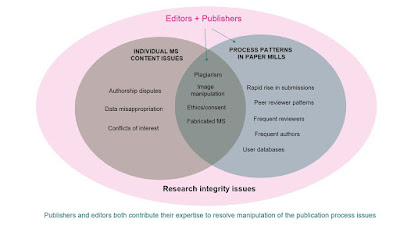Whether you are a busy academic journal editor volunteering your time to work on your journals, or a full-time professional editor, you have probably experienced that sinking feeling when a research integrity issue lands on your desk. You know what to do, but you also know that it will be a huge drain on your time. The management of such issues can take a low priority when there are ongoing and immediate editorial decisions to be made on current submissions.
The Committee on Publication Ethics (COPE) provides guidance on how to manage the most common publication misconduct scenarios, but, as well as issues of editor workload, unrecognised in-house tensions can slow down or even block their resolution. Fear of reputational damage, legal concerns, poorly defined responsibilities between editor and publisher and reluctance to share information can easily derail efforts to correct the published record.
Fear of reputational damage is a significant blocker to effective research misconduct investigation and management. Although retractions are seen as positive evidence that publishers and journals are committed to research integrity, some stigma around retractions remains. This is particularly true around egregious cases. Cries of, ‘How did that get past the peer reviewers? ‘and ‘How did the editor allow that through?’ will be inevitable. The embarrassment this can cause is even more acute when the case is that of manipulation of the publication process and involves many articles and journals. Such cases call into question the publisher’s processes, so it is not surprising that publishers will worry that attention around the resulting retractions will negatively impact their reputation.
Legal challenges to editorial decisions are on the rise. Publishers bear the legal consequences of editorial decisions, but editors are responsible for the integrity of the content of their journals. This can lead to direct conflicts of interest between editor and publisher. Long delays result as publishers’ legal teams and editors navigate through the evaluations necessary to resolve editorial and legal conflicts.
Another publisher editor conflict is around the idea of editorial freedom. Editors are rightly in charge of the content of their journals. They have the scientific expertise and access to an expert network to help them make judgements about scientific soundness and value. They should be free to make these judgements without interference from publishers. However, unless they are professional editors, they may not be up to date on publication ethics standards or the latest challenges to research integrity in the publishing industry. As research misconduct becomes more sophisticated, new expertise, which editors may not have, is needed to tackle it. This is pertinent to cases of manipulation of the publication process which are more about exploitation of the publisher’s processes than scientific content. To an editor, a fabricated manuscript can be indistinguishable from a legitimate one. Only the publisher can fully investigate.
Assumptions that editors who are eminent experts in their field, must also be experts at handling all types of research misconduct, and that by providing advice on editorial issues the publisher interferes with editorial freedom, hinder the resolution of research misconduct issues.
When it comes to responsibility for research integrity, an inflexible demarcation between editorial and publisher responsibilities can leave editors poorly supported and out of their depth.
The first steps to easing these tensions is to acknowledge they exist and adopt a proactive and collaborative approach to research integrity. This includes a strategy that: clarifies expectations of editors, authors and peer reviewers; sets robust core policies and processes; develops comprehensive resources for editorial staff and academic editors; ensures reliable lines of communication for editors to seek help; and regularly reviews policies and practices. Read more details on the essential components of a good research integrity strategy.
In addition, a pre-emptive approach to managing manipulation of the publication process, where the publisher, editors and other relevant experts agree on roles and responsibilities, what information will be shared and how decision-making processes will work, are key to the swift and successful resolution of such cases.
I am running a workshop that explores these hidden barriers and the practicalities of managing research misconduct at my workshop on 15 June. A 15% discount is available for ALPSP members. Find out more about the workshop and registration details.
Formerly a medical doctor and clinical researcher, Dr Jigisha Patel joined the publishing industry over 14 years ago as a medical editor. She later went on to specialise in research integrity. Dr Patel has worked with publishers, authors, reviewers, editors, institutions, and government organizations to resolve many different types of research integrity cases. As an independent research integrity specialist, Dr Patel now works with organizations that are committed to research integrity to reduce research misconduct and manage complex research integrity issues. Find out more.




No comments:
Post a Comment